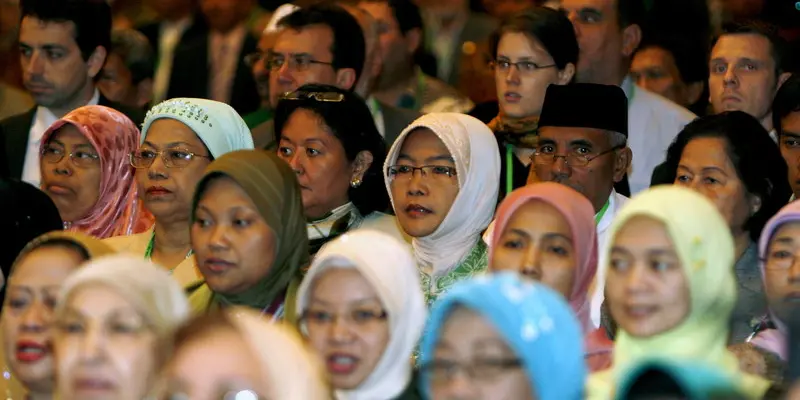
NU’s next challenge: Substantive policies on freedom of religion
February 15, 2022

By Eva Sundari
After almost 100 years in operation, last month Nahdlatul Ulama (NU), Indonesia’s most prominent Islamic organization, made history, electing its first women leaders.
Under the leadership of reform-minded scholar Yahya Cholil Staquf, 11 women were named on NU’s board for the first time, among them former first lady Sinta Nuriyah Wahid, her daughter and prominent activist Alissa Wahid, and Khofifah Indar Parawansa, the governor of East Java.
Although a long way from gender parity, the move was a breakthrough for the organization, and is at least a step toward addressing some of the challenges faced by women in Indonesia today, which includes, among other things, the use of genital mutilation in some parts of the country, restrictive laws on women’s rights, as well as the continued practice of polygamy and child marriage. The women elected to NU’s board all have established records of meaningful contributions to society in their own right, and their inclusion on the board must be the opportunity for them to have substantial influence within the organization when it comes to addressing issues such as these.
As well as being an important political vehicle, since at least the Reform years of the 1990s, NU has played a vital role in advocating for social inclusion and standing up for ethnic and religious minorities, including Papuans and Chinese-Indonesians. As just one example, Abdurrahman “Gus Dur” Wahid, the former Indonesian president and NU leader, has been dubbed the “father of Chinese-Indonesians” because of his role in revoking an instruction leftover from the Soeharto era that prohibited the development of Chinese culture and religion.
NU and its membership have also played a role in advancing women’s rights. In 2017, female NU members initiated the Indonesian Women’s Ulema Congress (KUPI), which gathered together more than 1,000 female global clerics to discuss issues such as the history of female religious authority, sexual and domestic health, and declared several fatwas that support women’s empowerment.
Indonesia’s more hard-line Islamist groups, with their conservative interpretation of the religion, may have attracted the bulk of the media attention in recent years, but it should not be forgotten that women in Indonesia have long pushed back against this vision of Islam. NU and its members have played an important role in that resistance, and the appointment of women to its board is the latest in a series of progressive ideas the organization has initiated.
It has strongly criticized polygamy, and advanced women’s reproductive health access, awareness, and education. Female NU members have also played important roles in advancing women’s issues around the archipelago. Some entered politics, pushing for pro-women legislation such as the Anti Sexual Violence Bill (TPKS) and the Protection of Household Workers Bill (PPRT), as well as the Health Bill passed in 2009, which permits abortions in cases of rape or related health concerns.
Currently, freedom of religion or belief (FoRB) in Indonesia is experiencing many challenges, and that extends to women’s rights. In its most recent annual report on civil and political rights in the country, Freedom House ranked Indonesia as “partially fair”. One of its lowest rankings came in the area of freedom of belief (scoring 1 out of 4), with issues ranging from official discrimination against religious minorities, such as restricted access to documentation, to “violence and intimidation” against Ahmadi and Shia communities.
The research group SETARA Institute recorded 180 incidents of FoRB violations in 2020, 12 of which were against women and children, while the National Commission on Violence Against Women has documented hundreds of discriminatory local regulations that specifically limit the fundamental rights of women in the name of religion.
As a prominent Islamic organization claiming about 90 million members, NU has a crucial role to play in addressing issues such as these. The election of women to its board should be celebrated as the important step that it is, but it also must result in meaningful representation, whereby these elected women in leadership roles can deliver substantive impact on the issues of FoRB and women’s rights.
Challenges remain for NU in addressing the more conservative mindsets within its internal bodies, but the election of women to its board is a welcome move in the right direction, toward ensuring a range of perspectives are heard, including those of women, and the organization promoting a moderate and progressive version of Islam to be followed by adherents in Indonesia, and further afield.
Eva Sundari is a board member of ASEAN Parliamentarians for Human Rights (APHR), a former Indonesian Member of Parliament (MP)
ASEAN Parliamentarians for Human Rights (APHR) was founded in June 2013 with the objective of promoting democracy and human rights across Southeast Asia. Our founding members include many of the region's most progressive Members of Parliament (MPs), with a proven track record of human rights advocacy work.